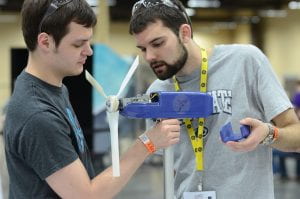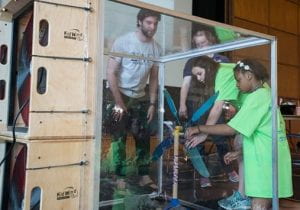There are many different ways that faculty, staff and students at the Penn State campuses can interact with members of their communities, local and state officials, and the public. These range from giving talks at meetings or schools, to organizing special events where researchers help educate and inform the community on specific topics. Outreach can include summer camps for kids at Penn State, or special classes that bring together people to address new issues. For example, to reach students in Kindergarten through high school, Penn State has run the PA Wind for Schools program, which has been funded by the U.S. Department of Energy since 2010. This recently has transitioned into PA REpowering Schools, with additional events on wind power planned for future years. An annual PA KidWind Competition has been held at University Park campus every year in the spring semester, and Teacher Professional Development Workshops are held annually to help prepare teachers to educate their students on wind and renewable energy topics. Outreach can also be to the retirement community, local government or Scouting troops. For instance, a course can be offered through the Osher Lifelong Learning Institute, or presentations can be made at retired living communities, such as Foxdale or The Village. Scouts are often looking for activities to engage their troops to earn badges. An activity can be aligned with their goals relatively easily.
While outreach efforts by people at Penn State opens discussions from the point of view of people on the campuses, it is also important that any discussion provide venues for the members of the communities to inform researchers, so that aspects of these technologies are viewed from all perspectives. Many renewable energy technologies are new, and therefore many people may be unfamiliar with them or concerned about their impact of their use on the communities. Social scientists at Penn State are therefore working to ascertain community responses to different technologies that are often unrelated to power generation, for example the impact of the view of wind turbines on mountains, how solar panels covering roofs can be changing the appeal of a skyline, or how dams modified to include power generation might impact local flood control. The community also seeks to understand applications and how technologies will impact them, such as how to navigate the electricity market and how to make good decisions about their purchasing decisions. Researchers can benefit from better understanding these questions and how they tie back to their own work. Opening a two-way conversation is essential at broadening the perspectives of all participants when bringing new technologies into our communities.
“In”reach
There are also many ways in which Penn State staff, faculty, researchers and students make efforts to reach-in to the Penn State community and provide activities for its own population. Club activities are a great example, which can also be considered co-curricular extensions of classroom experiences. There are also competitions, green teams, and advisory groups among staff and faculty/researchers. For example, Penn State has a Wind Energy Club which sends a team to the Department of Energy (DOE)-sponsored Collegiate Wind Competition each year and it has won this event four times. Penn State has also participated in the DOE Solar Decathlon in 2007 and 2009 and this program has now merged with the DOE Race to Zero competition, which Penn State has also been participating since its inception in 2014, winning several categories over the years. Teams of students, guided by faculty work on all of these programs. The College of Engineering also has a Sustainability Council and each College has a Green Team which is provided guidance by the Sustainability Institute regarding sustainability practices.
Communication is the key
The transition from fossil to renewable energy is going to improve the planet and change our lives. To make sure that members of our communities are prepared for and informed about possible changes to their own lifestyles, it is important to communicate with friends, families, and professionals that are working to research and implement changes to more sustainable forms of energy such as wind and solar energy. Penn State researchers are encouraged to reach out into the community to help to provide their expertise to interested groups. Members of our community should look to improve their knowledge of renewable energy through seminars, meetings, and reading more about the positive changes and benefits that can occur with a shift to renewable energy technologies.


